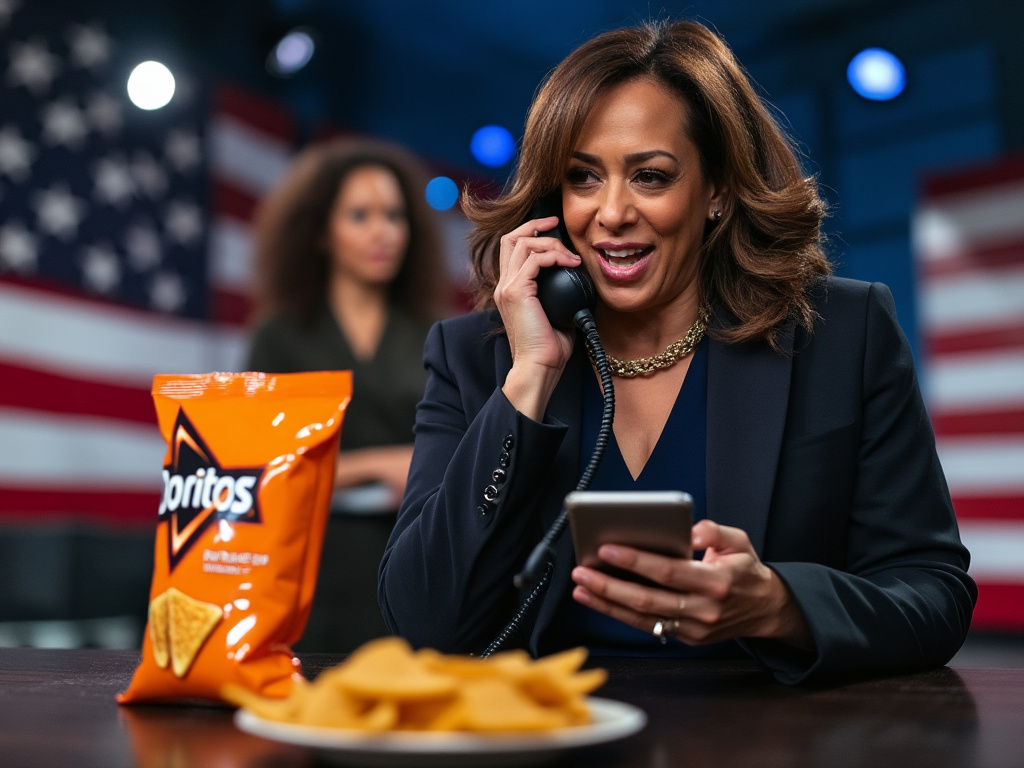
Kamalas Fake phone call.jpg
Kamala Harris’s Imaginary Phone Call
A Portrait in Pretend Politics
In the era of political theater, it takes a seasoned performer to pull off what Vice President Kamala Harris managed at the Democratic National Committee headquarters recently. With only a bag of Doritos and a steady smile, she strolled in to chat with staffers, offer last-minute encouragement, and then (in what would become the day’s main event) deliver a heartfelt, one-sided phone call that, as it turned out, wasn’t a call at all. Yes, this wasn’t just any political rallying—it was a masterclass in phantom politicking.
The scene was set. Staffers applauded. Harris, visibly excited, picked up a smartphone as if to connect directly with “Andrea,” the mythical “voter” on the other end. “Andrea, it’s Kamala Harris,” she said into the phone, and what followed was a touching monologue—directed at her phone’s photo app. The “call” was evidently nothing more than an elaborate pantomime, with no actual call screen in sight. Yet Harris, ever committed, stayed in character. “Thank you so very much,” she continued, with the bravado of a Shakespearean lead clinging to a prop sword. “It’s so important that everybody participates.” The only thing missing? A dial tone.
“Kamala’s all fake all the way down…”
When the image of this non-call hit the internet, the reactions were swift and, let’s face it, brutal. Conservative producer Alex Lorusso joked, “Those voices are coming from your head, not the phone.” And Blaze Media strategist Logan Hall was quick to brand this the next phase of Harris’s campaign: “It’s all fake all the way down.” The campaign staff might’ve staged the event with all the best intentions, but they hadn’t counted on the VP’s phone deciding to expose the illusion.
The best part? Harris didn’t flinch. Like any seasoned performer caught with the mic turned off, she plowed through, committed to the “call” as though nothing were amiss. The scene painted Harris not so much as a vice president on a mission but as someone channeling their inner thespian, delivering lines on cue and to an invisible audience. The whole thing felt a little too much like a scene from The Office: awkward, hyperbolic, and entirely removed from reality.
This is not the first time Harris has turned to the “fake call” as a go-to move, either. Back in September, as she stepped off Air Force Two, she was spotted with her headphones securely plugged in—both ears, mind you—yet somehow holding the phone to her head as she “spoke” into it. Double duty, if you will. Perhaps it was a clever diversion to dodge those pesky press questions about Hamas, but it also suggested a deep commitment to the art of avoiding difficult conversations by having… no conversations at all. Tim Murtaugh, a former Trump campaign director, tweeted what the public was already thinking: “When pretending to be on the phone… do not plug in the headphones and also hold the phone to your ear. This destroys the illusion.”
There’s something delightfully absurd about the whole situation. It’s like watching a child hold up a banana to “call” their mom, except this is the second-highest office in the land, and the stakes are a bit higher than playtime. There’s a hint of farce in imagining a VP who, in the age of ubiquitous connectivity, just can’t seem to land a real call. Imagine for a moment, if you will, an alternate reality where Harris is walking down the halls of the West Wing, whispering sweet policy promises to the flashlight app.
Beyond the humor, this moment taps into a larger commentary on what we’re willing to accept from our leaders. In the age of Instagram authenticity, voters crave realness, and moments like these deliver quite the opposite. Harris’s performance was almost too staged—an illusion intended to foster connection but which ultimately showcased the disconnect. Instead of a candid, unscripted moment, it was a missed call in the most literal sense.
If you’re left wondering whether this entire spectacle was more calculated than chaotic, you wouldn’t be alone. The vice president’s actions often suggest that, beneath the polished exterior, there’s a campaign more focused on optics than on substance. This particular gaffe reminded critics of the all-too-familiar political performance—where a few feel-good gestures (Doritos for the troops, anyone?) are meant to show “solidarity,” yet ultimately fall flat. It’s like the Doritos were a metaphor for the campaign itself: appealing on the surface but ultimately light on content.
Then there’s the choice of Doritos as a bonding gift. In a time when political division is at an all-time high, Harris took the bold, bipartisan approach of bringing a universally beloved snack. “Nothing says ‘I value your contributions’ quite like a pack of neon-orange corn chips,” she seemed to imply. Somewhere, the ghost of a serious political advisor must be groaning. But maybe that was the plan all along—a light-hearted distraction from the substance-free nature of the event itself.
Of course, this kind of over-the-top stagecraft isn’t new to political life. Candidates have posed with babies, pretended to eat corn dogs, and even chopped wood to seem “authentic.” But Harris’s fake phone call takes this genre to new heights. Not only did she miss the actual call, she missed the point. It’s one thing to be out of touch with voters; it’s another to be out of touch with reality—and your smartphone screen.
And still, Harris’s unwavering commitment to the bit deserves some admiration. In a political climate where everything is up for interpretation, Harris’s insistence on sticking to the script, even as it crumbled in her hands, was impressive. As pundits point out, at least she didn’t blame anyone else or break character. In the face of widespread mockery, Harris continued on as though nothing were amiss—a performance worthy of an Oscar, or perhaps a Razzie.
To Harris’s critics, this was yet another sign that the campaign relies more on theatrics than on substance. To her defenders, it was merely a blip, an accidental comedy bit on the road to the White House. To the rest of us, it was a reminder of just how much political theater permeates our public life—and how sometimes, when the curtain drops, we get to peek at the reality behind the stage.
Final Takeaway
In the end, Kamala Harris’s imaginary phone call and the Dorito diplomacy may go down as a footnote in campaign history, but the message it sent was loud and clear: sometimes, the “personal touch” is better left unmanufactured. Harris’s gesture was meant to inspire and energize, but instead, it left many voters with a sour taste—and not the nacho-cheese kind. The whole scene was less about voter engagement and more about scripted sincerity.
Maybe that’s the real takeaway. In a time when politicians scramble to show their “real side,” this was about as artificial as it gets, from the phone screen to the reaction. And like a dropped call that leaves you shouting into the void, sometimes it’s best to simply hang up and try again.
Originally Published at FarmerCowboy.com
2024-11-06 08:25:28
Karl Hoffman is a distinguished agriculturalist with over four decades of experience in sustainable farming practices. He holds a Ph.D. in Agronomy from Cornell University and has made significant contributions as a professor at Iowa State University. Hoffman’s groundbreaking research on integrated pest management and soil health has revolutionized modern agriculture. As a respected farm journalist, his column “Field Notes with Karl Hoffman” and his blog “The Modern Farmer” provide insightful, practical advice to a global audience. Hoffman’s work with the USDA and the United Nations FAO has enhanced food security worldwide. His awards include the USDA’s Distinguished Service Award and the World Food Prize, reflecting his profound impact on agriculture and sustainability.




